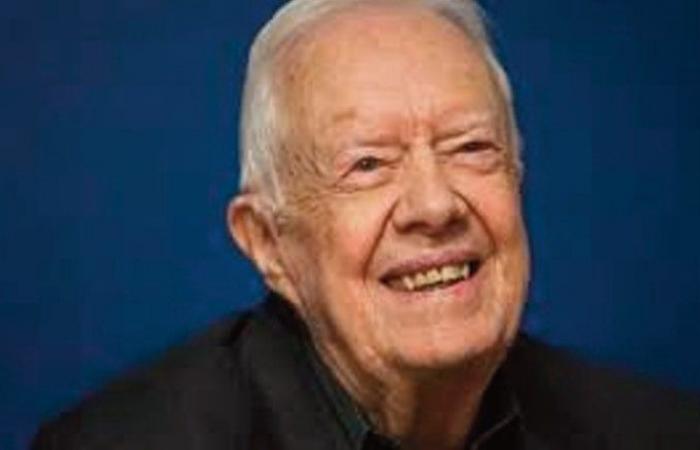Former American president and Nobel Peace Prize winner Jimmy Carter, who died on Sunday at the age of 100, occupies a special place in the American political landscape, forever tarnished by the hostage crisis in Iran on which his sole mandate has been completed.
Exited through the back door in 1981 after his severe defeat against the Republican Ronald Reagan, this Democratic president, often mocked for his clumsiness – his great naivety, his many detractors would say – was for a long time an outcast within his own party and brought joy cartoonists.
I thought, of course, I was going to die very quickly. I prayed. I didn’t ask God to let me live longer but I asked Him to give me a dignified attitude towards death. And I realized that I was completely serene in the face of death
More than three decades after his departure from the White House, however, a more nuanced image has gradually emerged.
Because of his action as ex-president, unanimously praised, but also a reassessment of some of his advances in a difficult period, first and foremost the peace agreements between Israel and Egypt.
Representative of a new generation of men from the South, more tolerant, more progressive on racial issues, Jimmy Carter will also remain as the American president who placed the defense of human rights at the heart of his diplomacy.
This fervent Baptist with an atypical career — from a naval officer to business, from the owner of a family peanut farm to the presidency — took office in an America still marked by the Watergate scandal which had pushed the president Nixon to resign.
“I am a man from the South and an American,” said this virtual unknown on the national political scene when he launched into the Democratic primary for the 1976 presidential election.
His arrival in power is full of promises for the Democratic camp which controls Congress and the White House for the first time since 1968.
The first two years started strong, with popularity ratings higher than those of Ronald Reagan or Barack Obama at the same stage of their mandate. He convinced the Senate to ratify the treaties on the Panama Canal in 1978, he advanced his pawns on the international scene.
But the euphoria will gradually fade and the awkwardness will take over, against the backdrop of the second oil crisis in 1979. An image of these “Carter years” will remain: that of the long lines of motorists coming across the country , stock up in a hurry for fear of shortage.
In July 1979, Jimmy Carter delivered a speech live on television that his opponents called “the speech of malaise” and which, according to them, summarized the main traits of a naive, pessimistic and weak man.
In a singular exercise, he cites at length some of the criticisms addressed to him about his lack of leadership or vision. Starting from the energy crisis, he broadens his remarks to evoke an “almost invisible threat” which weighs on American democracy: “A crisis of confidence”. “The symptoms of this crisis in the American spirit are everywhere,” he says, in a text with a particularly dark tone.
The end of his mandate will be weighed down by the Iranian nightmare: for 444 days, around fifty Americans will be detained after the storming of the United States embassy in Tehran by radical Islamic militants.
In April 1980, a helicopter-borne military operation to try to free them ended in a bitter failure. The hostages were released on January 20, 1981, the same day as President Ronald Reagan’s inauguration.
After the defeat, his own party wants to forget these difficult years. His presidency will be followed by three Republican mandates (Ronald Reagean then George HW Bush). To this day, few Democratic leaders claim his legacy.
In the balanced biography that he devoted to him, the historian Julian Zelizer, professor at Princeton University, underlines all of the “extraordinarily difficult” circumstances that Jimmy Carter had to face and which would have put him in difficulty “any president.”
But he also emphasizes the difficulties of this “non-conformist politician” in adapting to power. For the 39th President of the United States, “being an outsider in Washington has proven to be both a blessing and a curse, an opportunity and a burden,” he writes.
Mocked for his indecisions at the White House, Jimmy Carter’s strength was to reinvent himself after leaving the federal capital. So much so that this man with the broad, infectious smile will often be referred to, not without irony, as “the best ex-president” in the history of the United States.
When he left power in January 1981 at the age of 56, this passionate about democracy and social justice began a new chapter with undeniable energy.
At the head of the “Carter Center” that he created in Atlanta, he supervises dozens of elections around the world. A tireless traveler, he is found everywhere: in Mexico, Peru, Nicaragua, and even East Timor. In Haiti, in Cyprus, in North Korea, he offers his services, is tirelessly passionate, even if the results are sometimes tenuous.
In 2002, he was awarded the Nobel Peace Prize for “his decades of tireless efforts for the peaceful resolution of international conflicts, the advancement of democracy and human rights.”
In August 2015, Jimmy Carter began radiotherapy to treat cancerous brain tumors.
On this occasion, he summed up his unique career in simple terms: “The presidency was of course the pinnacle of my political career (…) but my life since leaving the White House has been, on a personal level , more rewarding.
During a celebration at the beginning of November in his Baptist church in the small town of Plains (Georgia, southeast) where he was born and where he lived most of his life, he returned, with great serenity – and a little humor too – on this episode.
“I thought, of course, that I was going to die very quickly. I prayed. I did not ask God to let me live longer but I asked him to give me a dignified attitude towards the death and I realized that I was completely serene in the face of death.






